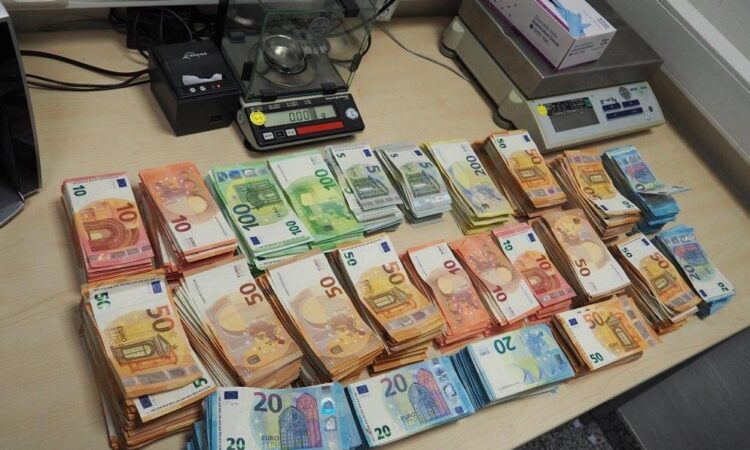
PRESS RELEASE No 20/2023
PDF version
A major customs operation has uncovered illicit movements of €18 million of cash potentially linked to money laundering, transnational criminal activities and terrorism financing. Operation BELENOS, led by the French Customs authorities, was carried out in 25 EU Member States.
Operation BELENOS resulted in the detection of around 400 cases of illicit accompanied and unaccompanied cash flows, mostly in air traffic (77,6%), road transport (18%), sea transport (3%) and postal shipments (0,6%). In particular, customs authorities discovered at least 64 cases of potential linkages with money laundering for around €3 million, and 20 cases of potential linkages with sanctions against Russia for its aggression against Ukraine for around €180,000. In addition, 34 cases of amounts below €10,000 were suspected to be related to criminal activity. In total, almost 420 natural persons were involved.
Other violations that customs authorities found were 6.5 kilograms of ecstasy, 4 kilograms of methamphetamine and €25,500 of counterfeit money.
More than 330 administrative or judicial investigations were launched based on the results achieved during operation BELENOS. Further enquiries into the matter are ongoing.
The European Anti-Fraud Office (OLAF) played a key role in this joint customs operation, providing financial, analytical, technical and logistical support, including the use of the secured Virtual Operations Coordination Unit (VOCU) application to enable the secure exchange of information during the operation. The European Commission’s Directorate-General for Taxation and Customs Union (DG TAXUD) shared its expertise on the implementation of Regulation (EU) 2018/1672 of 23 October 2018 on controls on cash entering or leaving the Union. Europol performed crosschecks in its databases, allowing the identification of potential criminal links. Moreover, operation BELENOS led to increased cooperation between customs authorities, Financial Intelligence Units (FIUs), tax and police authorities, and prosecutors.
Ville Itälä, OLAF Director-General, said: “Sharing intelligence and joining the dots is essential to stop cross-border illicit schemes and movements. OLAF is well placed to know that, as we have been fighting smugglers and cross-border fraud for many years now. For Operation Belenos, we put our tools and expertise at the disposal of colleagues in national authorities who fight illicit cash flows.”
Background
Operation BELENOS was led by the French customs authorities, in cooperation with the Spanish customs authorities and Europol as co-leaders, and with the support of OLAF and the European Commission (DG TAXUD). It was carried out from 28 November to 11 December 2022 in 25 EU Member-States: Austria, Belgium, Bulgaria, Croatia, Cyprus, the Czech Republic, Denmark, Estonia, Finland, France, Germany, Greece, Ireland, Italy, Latvia, Lithuania, Luxembourg, Malta, the Netherlands, Portugal, Romania, Slovakia, Slovenia, Spain and Sweden.
Operation BELENOS aimed to control the movements of accompanied cash and unaccompanied cash (being sent by freight, post or courier), equal to or in excess of €10,000 entering or leaving the EU, in accordance with Regulation (EU) 2018/1672. In addition, some participating Member-States carried out controls based on risk analysis on intra-EU movements of cash, in accordance with their respective national legislation and policies.
Further information on operation BELENOS can be found on the French customs website.
OLAF mission, mandate and competences:
OLAF’s mission is to detect, investigate and stop fraud with EU funds.
OLAF fulfils its mission by:
• carrying out independent investigations into fraud and corruption involving EU funds, so as to ensure that all EU taxpayers’ money reaches projects that can create jobs and growth in Europe;
• contributing to strengthening citizens’ trust in the EU Institutions by investigating serious misconduct by EU staff and members of the EU Institutions;
• developing a sound EU anti-fraud policy.
In its independent investigative function, OLAF can investigate matters relating to fraud, corruption and other offences affecting the EU financial interests concerning:
• all EU expenditure: the main spending categories are Structural Funds, agricultural policy and rural development funds, direct expenditure and external aid;
• some areas of EU revenue, mainly customs duties;
• suspicions of serious misconduct by EU staff and members of the EU institutions.
Once OLAF has completed its investigation, it is for the competent EU and national authorities to examine and decide on the follow-up of OLAF’s recommendations. All persons concerned are presumed to be innocent until proven guilty in a competent national or EU court of law.
For further details:
Kirill GELMI
Spokesperson
European Anti-Fraud Office (OLAF)
Phone: +32(0)2 29-88146
Email: olaf-media ec [dot] europa [dot] eu (olaf-media[at]ec[dot]europa[dot]eu)
ec [dot] europa [dot] eu (olaf-media[at]ec[dot]europa[dot]eu)
https://anti-fraud.ec.europa.eu
Twitter: @EUAntiFraud
LinkedIn: European Anti-Fraud Office (OLAF)
Theresa ZAHRA
Deputy Spokesperson
European Anti-Fraud Office (OLAF)
Phone: +32 (0)2 29-57270
Email: olaf-media ec [dot] europa [dot] eu (olaf-media[at]ec[dot]europa[dot]eu)
ec [dot] europa [dot] eu (olaf-media[at]ec[dot]europa[dot]eu)
https://anti-fraud.ec.europa.eu
Twitter: @EUAntiFraud
LinkedIn: European Anti-Fraud Office (OLAF)
If you’re a journalist and you wish to receive our press releases in your inbox, please leave us your contact data.






